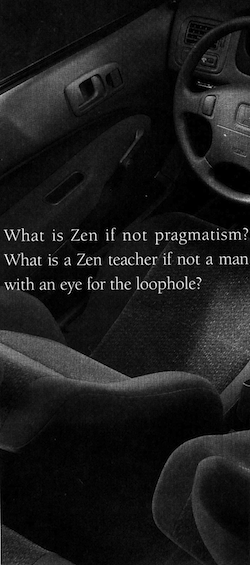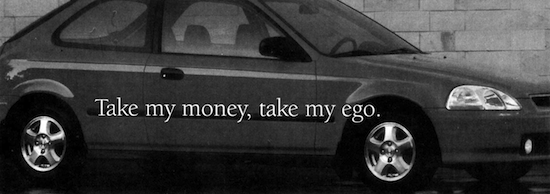
Two days after I drive my new Honda hatchback into the parking lot at the Zen Community of New York, a young woman named Heidi stands and speaks in a heartfelt voice at our weekly meeting of residents: “I think we all owe Larry a vote of gratitude for his generosity.”
At first I have no idea what she is talking about. It’s true that the community’s location is inaccessible to public transit and that several residents (including Heidi) have borrowed the car already, but I am still of the opinion that the Honda belongs to me and no one else. The fact that it is registered in the name of the community is a mere formality, suggested by Bernard Glassman Sensei, our teacher, so that I can make use of our tax exemption in paying for the car and its expenses. What is Zen if not pragmatism? What is a Zen teacher if not a man with an eye for the loophole? What are titles, registrations, personal checks, and tax deductions but the transient, superficial imagery of the relative world which we dissolve every moment with our zazen?
“Look at it this way,” Glassman said. “The community owns a car and you’re a member of the community. Why shouldn’t you be able to use it? Or turn it around. The community needs a car and you’ve donated one to us. What’s wrong with that? Even if you’re using the car, you’ll still be using it for community business, won’t you? Even the strictest IRS audit wouldn’t question your deduction.”
I’ve never found it easy to doubt people who gaze at me with admiration. How magical it seems that all eighteen of my fellow residents not only adore me but consider me proof of our teachings here—have I not “let go” of myself? Transcended attachment to property and money? Dissolved the boundaries between myself and others by allowing them to “share” in my good fortune? As Glassman says, we’re here to “open” to each other, to dissolve our sense of privacy and “specialness.” Buy a car, give it up. Take my money, take my ego. I am basking in the glow of the image I see in their eyes, a self so realized that I don’t even register my “generosity,” much less care if it is appreciated.
Next day Heidi borrows the car to pick up her boyfriend at the airport. Naturally, they take the long way home, stopping for dinner and other activities appropriate to reunion. It’s a fine spring evening and I have a mind to take a ride myself after zazen, but by not returning until well after midnight, they offer another happy challenge to my selfishness, the absurd instinct that leads me to persist in thinking that I and they are separate. Aren’t we all, as Glassman likes to say, teachers for each other? The next morning one of our carpenters makes a run to the lumberyard, which leaves the fine maroon carpet of the Honda’s trunk covered with sawdust. Anger rises, but later that day, when I loan the car to our cook to visit her parents in New Jersey, I get a whiff of freedom that leaves me lighthearted, almost intoxicated, as if it’s not just the car but my ego, my karma, my ignorance driving out of the parking lot.
Within a week the odometer passes nine hundred miles, and half a dozen duplicate keys have been made. Within two weeks, people don’t ask to borrow the car, just tell me when they’ll need it. One of our less functional residents takes it on an all-night jaunt to “dissolve” his mind. “What a practice!” he exclaims. “You can’t fix on anything when you’re watching the landscape rush by at eighty miles an hour.” Serving as meditation monitor, leading the group in walking meditation, I make certain to take us by the window that looks out over the parking lot, so I can see if the car is there. Less and less, when it isn’t, do I know where it has gone.
 How do you count your breaths when you’re counting the miles on your odometer? In the midst of a solitary retreat, I see a fully packed Honda speed out of the parking lot for a night on the town in Manhattan. Glassman is giving beautiful talks on generosity and surrender. “What is true giving, according to Buddhism? No giver, no receiver, and nothing given!” When I bring up the car in my private interviews with him—feeling horrible, of course, to waste this precious time with such banality—he smiles with pleasure. “Become the car!” he suggests. “Then you’ll have nothing to let go of!” My mind explodes with insight. Leaving the interview room, I feel as if I could buy a fleet of Hondas and turn every one of them over to him.
How do you count your breaths when you’re counting the miles on your odometer? In the midst of a solitary retreat, I see a fully packed Honda speed out of the parking lot for a night on the town in Manhattan. Glassman is giving beautiful talks on generosity and surrender. “What is true giving, according to Buddhism? No giver, no receiver, and nothing given!” When I bring up the car in my private interviews with him—feeling horrible, of course, to waste this precious time with such banality—he smiles with pleasure. “Become the car!” he suggests. “Then you’ll have nothing to let go of!” My mind explodes with insight. Leaving the interview room, I feel as if I could buy a fleet of Hondas and turn every one of them over to him.
A year later, for a variety of reasons, I decide to leave ZCNY and practice with Kyudo Roshi, a Japanese Rinzai Zen master who has opened a simple, “just sitting” zendo in Soho. The reasons are complicated, for sure, but part of it is the distraction of Glassman’s communal Zen—all this concern with property, cars, newsletters, etc.—and, conversely, the hunger I feel for a practice centered in zazen. Glassman relishes the tumult, the chance to prove that one can practice under any circumstance, but Kyudo Roshi says, “If this place busy as your office, why you want to come here?” No newsletters here, no weekly residents’ meetings, no committees, no need for cars because we’re less than three blocks from three different subway stations. Community? Our zendo has only one bathroom, which is something of a problem when 30 of us are doing“sesshin,”but when I discover a diner nearby where we can use the toilet, Roshi advises me not to mention it to anyone else. “If everybody know about it, you not able to use it yourself, Larry-san!”
It’s easy enough to pack my bags, stow my gear in the trunk of the Honda, and head back to the city, but what am I to do about the fact that the car I drive does not belong to me? I avoid the matter until several weeks later, when I receive a phone call from the treasurer at ZCNY, who informs me that an insurance bill has arrived. Clearly, I’m in a bind, but next morning, during zazen, I see the way out—another brilliant, tax-deductible solution! ZCNY will simply donate the Honda to the Soho Zendo! Who cares that Roshi doesn’t know how to drive or that everything the zendo needs is within three blocks of our building? Aren’t we incorporated? Tax exempt? The IRS won’t question our need for transportation and it certainly won’t question our right to receive charitable gifts.
Roshi’s English is hardly equipped for “tax deductible” or “pass-through donations,” not to mention “Well, you see, Roshi, even though it looks illegal, it’s really not.” When informed of my intentions, all he hears is that the zendo will own a car as a result of my generosity. “Very good, Larry-san! You very nice. Thank you! Thank you!” And even in his inscrutable eyes I see the light I saw in the eyes of my sangha mates at ZCNY, more than one of whom, when they hear that I have “taken back” the car, look at me with pity and offer that I have “learned nothing” from my practice.
Within a couple of weeks, the transfer is complete. Bill of sale, certificate of title, new registration (signed by Roshi), notarized philanthropic statement attesting to the fact that a one-year-old Honda hatchback with 31,657 miles has been donated by ZCNY to Soho Zendo. My name, of course, is not to be found on the documents. I am invisible, owner of nothing, but using the Honda more than ever since there’s nobody asking to borrow it. It’s as if I’ve discovered some ultimate magic trick that permits me to have my cake and eat it too. ZCNY forwards the insurance bill to Soho Zendo, where it is paid by its treasurer with money donated (and deducted) by me. Similar shenanigans cover garage fees, repair bills, even gas.
Finally, after zazen one evening, Roshi stops me at the door. “Larry-san, you have appointment? Maybe you talk business for a minute?” When everyone else has left, and he’s made us a cup of tea, he spreads out the account book on the table and leafs through it until he finds the page he wants. “Garage fees.” “Insurance.” “Manhattan Auto Repair.” He points them out one by one. “Larry-san, how come this? Maybe you explain.”
“Oh, that’s for the car, Roshi.”
“Car? What car?”
“The one I donated to the zendo.”
“When you donate? I not see car.”
“But I explained—”
“Zendo pay gas, zendo pay garage. Who drive car?”
“Well, I do, Roshi, but—”
“Zendo pay car and you drive it?”
“Well, you see, the zendo doesn’t actually pay, Roshi. I made a donation—”
“Donation?”
“Yes, last month. And the month before that too. I’m giving the zendo the money to pay for the car.”
“But you drive?”
“Well, not exactly, Roshi. That’s what I’m trying to explain. I made donations—”
“Larry-san, please! Donation, not donation, nothing matter. You make donation, you make donation. Thank you very much! You drive car, you pay for car, understand? You insincere! Irresponsible! Losing lot of virtue all this talk.”
Again and again, I try to explain things to him, each time with less success. He isn’t arguing anymore—always a dangerous sign with him—he’s just staring at me. Finally, he closes the matter in characteristic fashion: “OK, Larry-san, forget it! Anything you want, you do!”
I don’t sleep at all that night. My solution to the car problem is suddenly a mirror and what I see in it is not pretty: fake generosity, fatuous rationalization—all of it worse for occurring in the context of Zen. Next morning I telephone a couple of used car dealers to determine the Honda’s fair-market value. I write a check for that amount payable to the zendo. And that’s how it happened that I solved the famous koan: how do you buy a car you already own?

Thank you for subscribing to Tricycle! As a nonprofit, we depend on readers like you to keep Buddhist teachings and practices widely available.